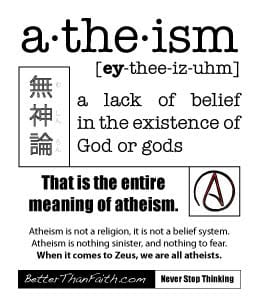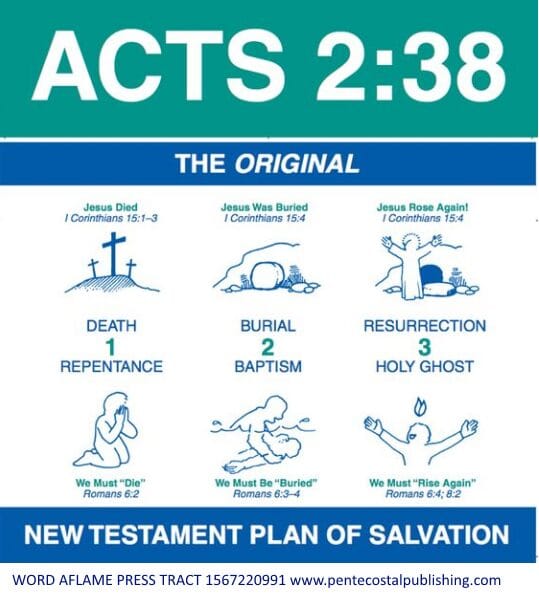
Originally written in March 2015. Updated, expanded, and edited.
An anonymous commenter left the following comment (no longer publicly available) on the Galatians 4 blog:
if the Bible is not truth; the Word of God – then NO ONE can be saved. If we do not believe the Bible, we cannot be saved.
This comment was left on a post on a blog entry titled, The IFB Pastor Turned Atheist: Those Who Fall Away (no longer available). The post is about my defection from Christianity. The author of the blog post agrees with the anonymous commenter’s view: that if we do not believe the Bible we cannot be saved. (Interestingly, the owner of the Galatians 4 website is now an unbeliever.)
Here’s the problem with this view:
First, it makes salvation dependent on reading the right words and believing the right things.
Second, the first-century Christian church had no Bible. They had the Old Testament, a text that makes no mention of Christian salvation and Christian oral traditions. Besides, most early Christians could not read or write.
Third, the gospels were not written until decades after Jesus Christ died and resurrected from the dead. The writings of the Apostle Paul were written first, and they are quite sparse when it comes mentioning Jesus and clearly articulating the Christian gospel. Paul’s writings need the gospels for the Christian/Pauline gospel to make sense.
Fourth, the printing press was invented 1500 years AFTER the death of Jesus. What Bible did people read before the invention of the printing press?
Fifth, illiteracy and the cost of a printed Bible meant that most Christians did not own a copy of the Bible. They relied on others to read the Bible to them or pass on the oral stories of Christianity.
Sixth, it took centuries to complete the canon of the Christian Bible. Prior to this, Christians had “incomplete” Bibles, often containing only a few books of the Bible. And to this day, Christians debate whether certain books belong in the canon of Scripture.
The anonymous commenter does what a lot of Christians do: he takes how things are now and reads it back into Christian church history. You know, if the Oxford, Calf-Skinned KJV Scofield Bible was good enough for the Apostle Paul it is good enough for me.
Most Christians have little knowledge about the long, complex, and contradictory history of the Bible and the Christian church. This lack of historical knowledge allows them to make absurd statements like the anonymous commenter made on the Galatians 4 blog.
The bigger problem is the way Fundamentalists read the Bible. When they read the phrase “Word of God” they assume it means “the Bible.” This, however, is not the case. Most instances in the Bible where we find the phrase “word of God” refer to spoken words or Jesus Christ himself.
The phrase “word of God” appears 49 times in the Bible. As you can easily see, the phrase has several different meanings:
- 1 Samuel 9:27 And as they were going down to the end of the city, Samuel said to Saul, Bid the servant pass on before us, (and he passed on,) but stand thou still a while, that I may show thee the word of God.
- 1 Kings 12:22 But the word of God came unto Shemaiah the man of God, saying . . .
- 1 Chronicles17:3 And it came to pass the same night, that the word of God came to Nathan, saying . . .
- Proverbs 30:5 Every word of God is pure: he is a shield unto them that put their trust in him.
- Mark 7:13 Making the word of God of none effect through your tradition, which ye have delivered: and many such like things do ye.
- Luke 3:2 Annas and Caiaphas being the high priests, the word of God came unto John the son of Zacharias in the wilderness.
- Luke 4:4 And Jesus answered him, saying, It is written, That man shall not live by bread alone, but by every word of God.
- Luke 5:1 And it came to pass, that, as the people pressed upon him to hear the word of God, he stood by the lake of Gennesaret . . .
- Luke 8:11 Now the parable is this: The seed is the word of God.
- Luke 8:21 And he answered and said unto them, My mother and my brethren are these which hear the word of God, and do it.
- Luke 11:28 But he said, Yea rather, blessed are they that hear the word of God, and keep it.
- John 10:35 If he called them gods, unto whom the word of God came, and the scripture cannot be broken . . .
- Acts 4:31 And when they had prayed, the place was shaken where they were assembled together; and they were all filled with the Holy Ghost, and they spake the word of God with boldness.
- Acts 6:2 Then the twelve called the multitude of the disciples unto them, and said, It is not reason that we should leave the word of God, and serve tables.
- Acts 6:7 And the word of God increased; and the number of the disciples multiplied in Jerusalem greatly; and a great company of the priests were obedient to the faith.
- Acts 8:14 Now when the apostles which were at Jerusalem heard that Samaria had received the word of God, they sent unto them Peter and John . . .
- Acts 11:1 And the apostles and brethren that were in Judaea heard that the Gentiles had also received the word of God.
- Acts 12:24 But the word of God grew and multiplied.
- Acts 13:5 And when they were at Salamis, they preached the word of God in the synagogues of the Jews: and they had also John to their minister.
- Acts 13:7 Which was with the deputy of the country, Sergius Paulus, a prudent man; who called for Barnabas and Saul, and desired to hear the word of God.
- Acts 13:44 And the next Sabbath day came almost the whole city together to hear the word of God.
- Acts 13:46 Then Paul and Barnabas waxed bold, and said, It was necessary that the word of God should first have been spoken to you: but seeing ye put it from you, and judge yourselves unworthy of everlasting life, lo, we turn to the Gentiles.
- Acts 17:13 But when the Jews of Thessalonica had knowledge that the word of God was preached of Paul at Berea, they came thither also, and stirred up the people.
- Acts 18:11 And he continued there a year and six months, teaching the word of God among them.
- Acts 19:20 So mightily grew the word of God and prevailed.
- Romans 9:6 Not as though the word of God hath taken none effect. For they are not all Israel, which are of Israel . . .
- Romans 10:17 So then faith cometh by hearing, and hearing by the word of God.
- 1Corinthians14:36 What? came the word of God out from you? or came it unto you only?
- 2 Corithians 2:17 For we are not as many, which corrupt the word of God: but as of sincerity, but as of God, in the sight of God speak we in Christ.
- 2 Corinthians 4:2 But have renounced the hidden things of dishonesty, not walking in craftiness, nor handling the word of God deceitfully; but by manifestation of the truth commending ourselves to every man’s conscience in the sight of God.
- Ephesians 6:17 And take the helmet of salvation, and the sword of the Spirit, which is the word of God . . .
- Colossians 1:25 Whereof I am made a minister, according to the dispensation of God which is given to me for you, to fulfil the word of God;
- 1 Thessalonians 2:13 For this cause also thank we God without ceasing, because, when ye received the word of God which ye heard of us, ye received it not as the word of men, but as it is in truth, the word of God, which effectually worketh also in you that believe.
- 1 Timothy 4:5 For it is sanctified by the word of God and prayer.
- 2 Timothy 2:9 Wherein I suffer trouble, as an evil doer, even unto bonds; but the word of God is not bound.
- Titus 2:5 To be discreet, chaste, keepers at home, good, obedient to their own husbands, that the word of God be not blasphemed.
- Hebrews 4:12 For the word of God is quick, and powerful, and sharper than any two-edged sword, piercing even to the dividing asunder of soul and spirit, and of the joints and marrow, and is a discerner of the thoughts and intents of the heart.
- Hebrews 6:5 And have tasted the good word of God, and the powers of the world to come,
- Hebrews 11:3 Through faith we understand that the worlds were framed by the word of God, so that things which are seen were not made of things which do appear.
Hebrews 13:7 Remember them which have the rule over you, who have spoken unto you the word of God: whose faith follow, considering the end of their conversation. - 1 Peter 1:23 Being born again, not of corruptible seed, but of incorruptible, by the word of God, which liveth and abideth for ever.
- 2 Peter 3:5 For this they willingly are ignorant of, that by the word of God the heavens were of old, and the earth standing out of the water and in the water . . .
- 1 John 2:14 I have written unto you, fathers, because ye have known him that is from the beginning. I have written unto you, young men, because ye are strong, and the word of God abideth in you, and ye have overcome the wicked one.
- Revelation 1:2 Who bare record of the word of God, and of the testimony of Jesus Christ, and of all things that he saw.
- Revelation 1:9 I John, who also am your brother, and companion in tribulation, and in the kingdom and patience of Jesus Christ, was in the isle that is called Patmos, for the word of God, and for the testimony of Jesus Christ.
- Revelation 6:9 And when he had opened the fifth seal, I saw under the altar the souls of them that were slain for the word of God, and for the testimony which they held . . .
- Revelation 19:13 And he was clothed with a vesture dipped in blood: and his name is called The Word of God.
- Revelation 20:4 And I saw thrones, and they sat upon them, and judgment was given unto them: and I saw the souls of them that were beheaded for the witness of Jesus, and for the word of God, and which had not worshipped the beast, neither his image, neither had received his mark upon their foreheads, or in their hands; and they lived and reigned with Christ a thousand years.
The word “scripture” appears thirty-two times in the Bible. Most of the time, the word scripture refers to the Old Testament, a text that is devoid of any mention of Jesus, the gospel, or ANYTHING Christian, for that matter.
The Bible states in John 1:1-2 that Jesus was the Word:
In the beginning was the Word, and the Word was with God, and the Word was God. The same was in the beginning with God. (The rest of John chapter 1 makes it clear that the “Word” John 1:1-2 is speaking of is Jesus, not the Bible.)
With this thought in mind, that Jesus is the Word, let’s look at Hebrews 4:12-14:
For the word of God is quick, and powerful, and sharper than any two-edged sword, piercing even to the dividing asunder of soul and spirit, and of the joints and marrow, and is a discerner of the thoughts and intents of the heart. Neither is there any creature that is not manifest in his sight: but all things are naked and opened unto the eyes of him with whom we have to do. Seeing then that we have a great high priest, that is passed into the heavens, Jesus the Son of God, let us hold fast our profession.
Raise your hand if you have heard Hebrews 4:12-13 quoted in reference to the Bible, the Word of God. Anyone raised in a Baptist church has heard this countless times. However, look closely at Hebrews 4:12-14. Is the word of God here the Bible or Jesus? Notice the male pronoun in the phrase manifest in HIS sight? Verse 14 makes the “who” of the text very clear when it says, “Seeing then that we have a great high priest, that is passed into the heavens, Jesus the Son of God…”
The whole point of this exercise is to show that it is important NOT to read preconceived ideas and beliefs into the Biblical text. Pastors breed ignorance when they quote verses to “prove” a point and do not convey to the congregation what the text actually says. They also breed ignorance when they refuse to say, not “the Bible says” or “God says,” but “our church says,” or “I say.” Far too many preachers are like Al Shannon, Jr, a fifty-year member of the Church of Christ. Shannon says about himself:
I adhere to the principle of speaking where the bible speaks, and remaining silent where the bible is silent. I do not add to or take from God’s Word nor do I go beyond that which was written. I prove all things by the scripture, and by no other source. This site is designed to preach the gospel and doctrine of [the Churches of] Christ unto all the world.
This kind of thinking is common in every sect that believes the Bible is an inerrant, infallible text. They think THEIR interpretation is the one, true, exact interpretation, and they alone are preaching the pure word of God. They are naïvely or deliberately ignorant about the influence of geography, culture, environment, and tribal affiliation on what one believes. (Please see Why Most Americans are Christian.) In their minds, they believe exactly what was written on parchment 2,000 years ago. In Shannon’s sect, many of the churches have a building cornerstone that says AD 33. That’s right, just like the Catholic and Landmark Baptist sects, they believe they are the one true church, established by Jesus to propagate the true gospel to the ends of the earth.
This kind of intransigence closes minds off from any other belief or idea. Until people dare to think that they could be wrong, that their sect might be wrong, or that the claims they make for the Bible might be false, there is little to no hope of reaching them. They are intellectually walled off from any voice but their own.
Bruce Gerencser, 68, lives in rural Northwest Ohio with his wife of 47 years. He and his wife have six grown children and sixteen grandchildren. Bruce pastored Evangelical churches for twenty-five years in Ohio, Texas, and Michigan. Bruce left the ministry in 2005, and in 2008 he left Christianity. Bruce is now a humanist and an atheist.
Your comments are welcome and appreciated. All first-time comments are moderated. Please read the commenting rules before commenting.
You can email Bruce via the Contact Form.











